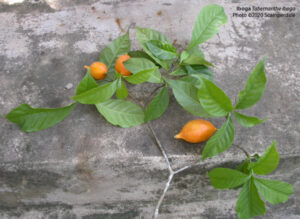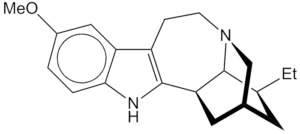About Iboga
What is iboga and where does it come from?
 Iboga is a perennial rainforest shrub native to central West Africa, specifically in Gabon and Cameroon. Its scientific name is Tabernanthe iboga, and it belongs to the Apocynaceae family. The plant’s root bark contains a psychoactive alkaloid called ibogaine, which has been traditionally used for spiritual and healing purposes by the Bwiti people of Gabon for hundreds of years. Iboga has also gained attention in recent years for its potential therapeutic benefits in treating addiction, depression, and other mental health conditions. In addition, iboga has been used in religious and shamanic practices by people outside of Africa, particularly in Europe and North America.
Iboga is a perennial rainforest shrub native to central West Africa, specifically in Gabon and Cameroon. Its scientific name is Tabernanthe iboga, and it belongs to the Apocynaceae family. The plant’s root bark contains a psychoactive alkaloid called ibogaine, which has been traditionally used for spiritual and healing purposes by the Bwiti people of Gabon for hundreds of years. Iboga has also gained attention in recent years for its potential therapeutic benefits in treating addiction, depression, and other mental health conditions. In addition, iboga has been used in religious and shamanic practices by people outside of Africa, particularly in Europe and North America.
What are the effects of iboga on the human body and mind?
The effects of iboga on the human body and mind can be complex and varied, depending on several factors such as dosage, set and setting, and individual characteristics. Generally, iboga is known for producing profound and long-lasting experiences that can include intense introspection, emotional release, and spiritual insights. Some of the reported effects of iboga include:
- A feeling of increased mental and physical energy
- Altered states of consciousness, including dreamlike visions and lucid dreaming
- Increased awareness and introspection, leading to insights about oneself and one’s life
- Emotional release, including the surfacing of repressed memories or trauma
- Relief from physical pain and discomfort
- Reduced cravings and withdrawal symptoms in individuals with addiction
- Enhanced sense of empathy and connectedness with others and the natural world
- Nausea, vomiting, and other physical discomfort, especially at higher doses.
It is important to note that iboga is a powerful substance and should be approached with caution and respect. It can produce intense and potentially challenging experiences that require careful preparation, guidance, and integration.
what is the difference between iboga and ibogaine?
 Iboga and ibogaine are related but distinct substances. Iboga refers to the plant Tabernanthe iboga, while ibogaine is a specific alkaloid found in the plant’s root bark.
Iboga and ibogaine are related but distinct substances. Iboga refers to the plant Tabernanthe iboga, while ibogaine is a specific alkaloid found in the plant’s root bark.
Ibogaine is one of several alkaloids found in the root bark of the iboga plant, and it is the primary psychoactive component responsible for the plant’s effects on the human body and mind. Ibogaine has been the subject of much research in recent years due to its potential therapeutic uses in treating addiction, depression, and other mental health conditions.
While ibogaine is the most well-known and studied alkaloid found in iboga, the plant contains several other alkaloids that can have their own unique effects on the body and mind. It is important to note that the plant’s full range of alkaloids is necessary for a complete and effective experience, and that isolating ibogaine alone may not provide the same level of healing and spiritual insight as the whole plant.
How does iboga compare to other psychedelics in terms of its effects and uses?
Iboga is often compared to other psychedelics such as psilocybin, LSD, and ayahuasca in terms of its effects and uses, but it has some unique characteristics that distinguish it from these substances.
One of the most notable differences between iboga and other psychedelics is the length and intensity of the experience. Iboga can produce effects that last up to 24 hours or longer, and can be much more physically and emotionally challenging than other psychedelics. This can make iboga a powerful tool for deep introspection and healing, but it also requires careful preparation, support, and integration.
Another unique aspect of iboga is its potential therapeutic uses in treating addiction, particularly to opioids. While other psychedelics have shown promise in treating addiction and other mental health conditions, iboga and its primary alkaloid ibogaine have received significant attention for their ability to reduce withdrawal symptoms and cravings in individuals with opioid addiction.
In terms of spiritual and religious uses, iboga has a long history of use in African shamanic and religious practices, particularly among the Bwiti people of Gabon. Some proponents of iboga argue that it offers a more grounded and earthy experience than other psychedelics, with a stronger emphasis on physical sensations and emotional release.
Overall, while iboga shares some similarities with other psychedelics, its unique properties and potential therapeutic uses make it a distinct and valuable tool for healing and transformation.
What are the potential risks and side effects of iboga use?
Iboga can produce powerful effects on the body and mind, and there are several potential risks and side effects associated with its use. Some of these include:
Physical discomfort: Iboga can cause nausea, vomiting, diarrhea, and other physical discomforts, particularly at higher doses.
Cardiovascular risks: Iboga can affect the heart and cardiovascular system, particularly at higher doses. This can lead to changes in blood pressure, heart rate, and rhythm, and can be particularly risky for individuals with preexisting heart conditions.
Psychiatric risks: Iboga can produce intense and potentially challenging experiences that may be overwhelming for some individuals.
Interactions with other substances: Iboga can interact with other drugs and medications, particularly opioids and other central nervous system depressants. These interactions can be dangerous and potentially life-threatening.
consequences.
It is important to note that the risks and side effects of iboga can be mitigated through careful preparation, guidance, and integration. Individuals considering iboga use should work with an experienced and knowledgeable practitioner who can provide a safe and supportive environment.
What is the current state of research on iboga and its potential therapeutic uses?
Research on iboga and its potential therapeutic uses is still in the early stages, but there has been growing interest and attention in recent years. Some of the areas where iboga is being studied include:
Addiction treatment: One of the most promising areas of research on iboga is its potential use in treating addiction, particularly to opioids. Preliminary studies have shown that ibogaine can reduce withdrawal symptoms and cravings, and may help individuals to achieve long-term abstinence.
Depression and anxiety: Some research has suggested that iboga may have antidepressant and anxiolytic effects, and may be helpful in treating conditions such as depression and post-traumatic stress disorder (PTSD).
Cognitive function: There is some evidence to suggest that iboga may have cognitive-enhancing effects, and may be helpful in improving memory and cognitive flexibility.
Neuroplasticity: Iboga has been shown to increase the production of brain-derived neurotrophic factor (BDNF), a protein that plays a key role in neuroplasticity and brain function.
Spiritual and personal growth: Some studies have suggested that iboga may be helpful in promoting spiritual and personal growth, and may be useful as a tool for self-exploration and self-improvement.
How can one prepare for and integrate an iboga experience?
Preparing for and integrating an iboga experience is an important part of ensuring a safe and beneficial experience. Here are some tips for preparing for and integrating an iboga experience:
Preparing for an Iboga Experience:
Follow pre-ceremony guidelines: Follow the guidelines provided for preparing for an iboga ceremony, such as abstaining from certain foods and substances, and refraining from sex and other activities in the days leading up to the ceremony.
Set intentions: Setting clear intentions for the iboga experience can help to focus the experience and provide a framework for integration.
Practice mindfulness and meditation: Practicing mindfulness and meditation in the weeks leading up to an iboga experience can help to calm the mind and prepare for the experience.
Integrating an Iboga Experience:
Give yourself time: It is important to give yourself time to integrate the experience, both physically and emotionally. It may take several days or weeks to fully process the experience and integrate its lessons.
Practice self-care: Practicing self-care, such as getting enough sleep, eating healthy foods, and engaging in exercise or other physical activities, can help to support physical and emotional healing.
Journaling: Keeping a journal can be helpful in processing the experience and integrating its lessons.
Engage with the Bwiti community an connect with people who understand Bwiti and Iboga.
How do I know if Iboga is right for me?
Not many people have heard of Iboga. If you are reading through this and have been wondering about Iboga, it is very likely that the spirit of Iboga has chosen you. If you feel called by the medicine, you should consider the following points:
Your health status: Iboga is not recommended for individuals with certain health conditions, such as heart disease. It is important to talk to us about your condition to find out whether iboga is safe for you.
Your mental health history: Iboga can have powerful psychological effects and is not recommended for individuals with a history of certain mental health conditions, such as psychosis or bipolar disorder. It is important to talk to us to determine whether iboga is safe for you.
Your goals and intentions: Iboga can be helpful for individuals seeking spiritual or personal growth, as well as for those seeking to overcome addiction or other mental health conditions. It is important to have clear goals and intentions for the experience and to make sure that they are aligned with the potential benefits of iboga.
Your personal values: Iboga is a powerful and potentially life-changing experience, and it is important to consider whether it aligns with your personal values and beliefs.